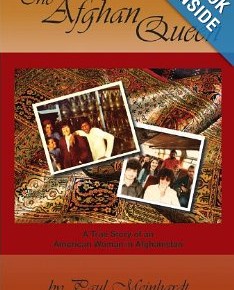The Afghan Queen—a Review
For 35 years, I was a teacher. My life revolved around one school, one classroom, a multitude of kids and lessons. It was a good life that allowed me to be creative and watch the eyes of 7th graders light up with learning. It was a life very successful–within narrow parameters.
However, I’ve always admired people who lived very different lives, who never punched a clock, never stayed in one location, traveled the whole world as their classroom. Such a life fills Paul Meinhardt’s The Afghan Queen: A TrueStory of an American Woman in Afghanistan.
This very interesting book is part travelogue, part memoir, part American Dream success story, part political commentary, and all love story. Paul’s wife, Lela, who passed away in 2000, was a wife and mother, a free spirit, a dreamer, a wanderer. Between 1975 and 1979, with the blessing of her supportive family, her dreams took her fifteen times to Afghanistan, where she also developed into an international diplomat and a very successful business woman.
Working as an art importer in the U.S., Lela was very successful, but also frustrated because her supplier was unreliable. Solution? Go to Afghanistan herself, the springboard for all these trips. Often she went by plane to Kabul, via Frankfurt and Zurich and other European cities where she had established business contacts to buy and display the Afghan art she returned with. Often she had to fly on Arianna Airlines, dubbed “Scarianna” by the passengers.
Sometimes though, she traveled via a hippie caravan of Sannyasins, European members of an Indian sect on their way to Delhi, via Kabul. Along the way, she made contact with local artists, while also serving as house mother and auto mechanic for their vulnerable transport vehicles: “We worked out a system to change flats in under 30-minutes. . . . As driver and mechanic, I’d become quite fond of old-lady-bus.” (p. 194)
An American woman alone in Afghanistan is not the safest of scenarios. However, this charming, adventurous lady learned from her contacts how to negotiate in a foreign culture. The key concept was “baksheesh”—flirting, tipping, bribing, socializing to expedite a deal. Her ace in the hole was off brand levis. She kept several pair on hand to give the guards so they could speed through border checkpoints. And to negotiate properly she became like family to the people she dealt with. Thus one contact would lead her to another to another, all stemming from an original contact who liked her style and virtually adopted her as part of the family.
Her main interest, of course, was the art—the art she could sell. That included a wide variety of metal ware: bronze, copper, silver. Jewelry of turquoise, golden serpentine, Afghan amber, and of course, the beautiful blue of lapis, were among her mainstays. But she loved it all, selling folk musical instruments, wall hangings, prayer beads, textiles, decorative camel harnesses and even opium molds. Her wandering inquisitive spirit took her to dealers everywhere to indulge her interest in native art—and profit.
After all her time in Afghanistan, she knew most everyone, and was even invited to parties at the embassys to schmooze with the ambassadors. From these knowledgeable people, she learned that her adventure would soon be over, that the Soviet Union was taking over Afghanistan. That meant she should have the good sense to get out—which she did.
This book will win no prizes for literature. The writing is clear, but simple, with little attempt at artistic writing. However, if readers would like an interesting book of adventures by an indomitable personality to pull them out of their humdrum lives, then The Afghan Queen is the book.
Bruce Roberts
June, 2013
Bruce Roberts is a poet and schoolteacher from Hayward, California. He may be reached at brobe60491@sbcglobal.net
Paul Meinhardt’s Afghan Queen was published by New Jersey’s Turn the Page, and may be purchased here: http://www.afghanqueen.net/


Pingback: Turn the Page Publishing | Independent Publishing | Print and eBook Publishing